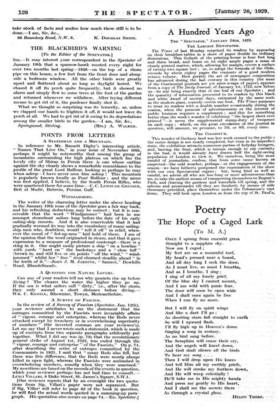POINTS FROM LETTERS A STATESMAN AND A MOUNTAIN.
In reference to Mr. Bassett Digby's interesting article,
Names That Live On," in your issue of November 10th, perhaps it might be noteworthy that among the group of mountains surrounding the high plateau on which lies the lovely city of Shiraz in Persia there is one whose outline against the sky clearly shows a remarkable resemblance to the profile of the great Lord Balfour, looking as perhaps he may when asleep—I have never seen him asleep ! This mountain is popularly known locally as Poue Balfour ; and the name was first applied, I believe, by the South Persia Rifles, who were quartered there for some time.—C. C. LEWIS-DE GRENIER, Belt at Mudir, Bahrein, Persian Gulf.
WINDJAMMERS.
The writer of the charming letter under the above heading in the January 19th issue of the Spectator goes a fair way back, and his refreshing deductions may be correct • but it is con- ceivable that the word " Windjammer " had been in use amongst steamboat sailors long before the date of his early sailing-ship records. And it is also- conceivable that it had gradually wormed its way into the vocabulary of many sailing- ship men who, doubtless, would " roll it off ' in relief, when- ever the mood of " fed-up-ness " laid hold of them. I am of the opinion that the word originated in steam, and that it gave, expression to a measure of professional vontempt—there is a sting in it. One might easily picture a ship " on a bowline " with yards " hard on " the backstays and a " close luff " thrown in, and still five or six points " off the wind," " wind- jammed " whilst her " free " rival churned steadily ahead " in the teeth of it."JonN J. M. JARDINE, " Sannox," Dowhills
- Road, Blundellsands.
A QUESTION FOR NATURE LOVERS.
Can any of your readers tell me why gannets rise up before diving ? The clearer the water the higher they go up. If the sea is what sailors call " dirty," i.e., after the storm they only ascend a short distance before diving.—, War. C. KETTLE, Rhowniar, Towyn, Merionethshire.
A SURVEY OF FASCISM.
In the review of A Survey of Fascism (Spectator, Jan. 12th),
your reviewer attributes to me the statement that the outrages committed by the Fascists were invariably affairs
of vigour, courage and enterprise, whereas the Reds never attacked except by treachery or in overwhelming superiority of numbers " (the inverted commas are your reviewer's). Let me say that I never wrote such a statement, which is made up of excerpts from two separate paragraphs arbitrarily put together. What I did say was (p. 79) that the revolutionary general strike of August 1st, 1922, was ended through the " vigour, courage and enterprise " of the Fascists." On p. 74, after describing the series of outrages committed by the Communists in 1921, I -said that many Reds also fell, but- there was this difference, that the Reds were nearly always killed in open fight, whereas the Fascists were ambushed in overwhelming numbers, usually when they were unarmed." My assertions are based on the records of the events in question, which your reviewer perhaps has not had time to consult.— Limax VILLARI, 8 Duke Street, St. James's Square, S.W.1. [Our reviewer regrets that by an oversight the two quota- tions from Sig. Villari's paper were not separated. But if Sig. Villar; will refer to page 82 of the book in question, he will find the actual words quoted in a summing-up pare: graph. His quotation also occurs on page 74.—En. Spectator.]








































 Previous page
Previous page